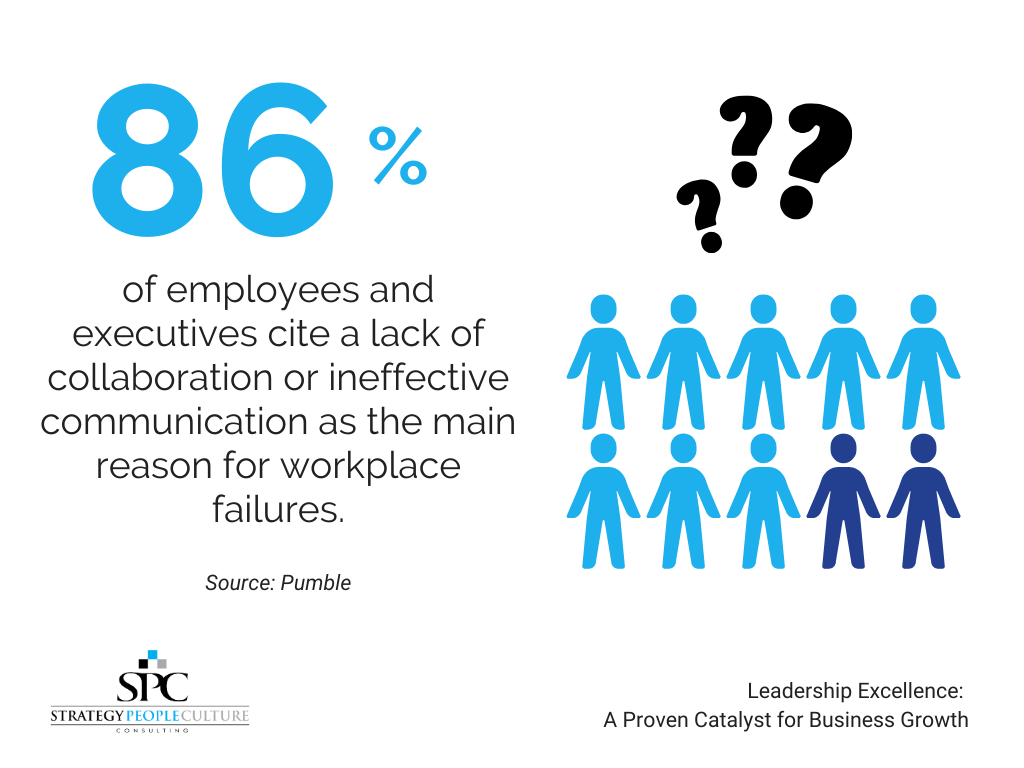Leadership Excellence: A Proven Catalyst for Business Growth

Imagine steering a ship through turbulent waters without a skilled captain at the helm. The chances of landing at the desired destination lessen with every passing wave. Similarly, in the business world, effective leadership is what keeps an organization afloat, rather than just paddling recklessly in circles among the complexities of the market. It then raises the question of how improving your leadership abilities can consequently improve your business.
Let this sink in: according to Zippia, 83% of companies feel that developing leaders at all levels is important, and yet only 5% have successfully implemented leadership development across all levels. This gap presents one of the largest opportunities for investment in leadership development to drive success within a company. Furthermore, organizations that invest in leadership development also state that they improve their leadership skills by 60% through mentoring. This statistic underlines the real benefits of focusing on leadership growth within an organization.

Defining Leadership Excellence
Leadership excellence epitomizes the art of leadership and inspiration that drives teams to work towards achieving organizational goals. It is well beyond basic management as it brings together visionary thinking, emotional intelligence, and strategic acumen. The best leaders who embody this excellence not only excel in decision-making and communication skills but also know how to sense the trends within their industry and how to touch their team at a deeper level. It is this holistic approach that will enable business success since it will engender a culture of innovation, resilience, and employee engagement, propelling the organization toward sustained growth and adaptability in a competitive market.
The Impact of Leadership on Organizational Performance
Leadership influences many aspects of an organization: employee engagement, productivity, and overall culture. Research studies reveal that management leadership is characterized by concern both with task performance and with people’s needs, aspirations, and expectations. It is established that organizational leadership quality and employee motivation levels are related in a direct and positive way; leaders can indeed create a motivated workforce.

A systematic literature review of studies published between 2015 and 2023 revealed that leadership effectiveness is a highly significant determinant of many performance outcomes, including employee satisfaction, productivity, and financial results.
In addition, organizations that invest in leadership development reap tangible rewards. For example, companies that invest in leadership training have experienced significant returns on investment. This is a clear indication of the importance of developing leadership skills within an organization.
Key Leadership Qualities That Drive Business Success
Certain leadership qualities are consistently associated with positive business outcomes. Developing these traits can significantly enhance a leader’s effectiveness:
- Visionary Thinking
- Emotional Intelligence
- Building Leadership Competence
- Strategic Learning
- Effective Communication
- Accountability
- Adaptability
Let’s explore how these qualities can elevate your leadership and business to new heights.

Visionary Thinking: Charting the Course
Visionary thinking enables leaders to anticipate future trends and steer their organizations toward long-term success. By cultivating a visionary mindset, leaders can inspire innovation and guide their teams through transformative change. To develop this mindset, leaders should:
- Embrace Curiosity: Continuously seek knowledge and remain open to new ideas.
- Strategic Foresight: Analyze market trends to anticipate future challenges and opportunities.
- Encourage Creativity: Foster an environment where innovative ideas are valued and explored.
Case Studies of Visionary Leaders
- Steve Jobs (Apple Inc.): Jobs’ visionary leadership revolutionized multiple industries, from computing to music and mobile devices, by focusing on innovation and user experience.
- Indra Nooyi (PepsiCo): Nooyi’s strategic redirection of PepsiCo towards healthier products showcased her visionary approach, aligning the company with emerging consumer health trends.
Emotional Intelligence: The Heart of Effective Leadership
Emotional Intelligence (EI) refers to the ability to recognize, understand, and manage one’s own emotions, as well as those of others. High EI is a strong predictor of leadership effectiveness, as it enhances interpersonal relationships, decision-making, and conflict resolution. Leaders can elevate their EI through:
- Self-Awareness: Reflect on personal strengths and areas for improvement.
- Self-Regulation: Practice controlling impulses and adapting to changing circumstances.
- Empathy: Strive to understand and share the feelings of team members.
Training: Building Leadership Competence

Training programs are instrumental in developing specific leadership competencies. Leaders can enhance their skills by:
- Exploring Leadership Courses and Certificates: Enroll in programs that focus on areas such as strategic planning, communication, and team management.
- Leveraging Business School Programs and Executive Education: Participate in advanced education opportunities to gain deeper insights into leadership theories and practices.
- Specialized Training: Pursue training tailored to specific competencies, such as negotiation or crisis management.
- Executive Coaching: Engage in one-on-one coaching to develop leadership skills and address specific challenges.
Strategic Learning: Committing to Continuous Improvement
Perpetual learning is essential for leaders to remain effective and relevant. To foster continuous improvement:
- Create a Personal Development Plan: Set clear learning objectives aligned with career goals.
- Utilize Feedback: Seek constructive feedback to identify areas for growth and adjust behaviors accordingly.
- Engage in Reflective Practice: Regularly assess experiences to derive lessons and enhance future performance.
Research indicates that transformational leadership is particularly effective in driving business success, as it encourages adaptability and a proactive approach to challenges.
Effective Communication: The Cornerstone of Leadership
Effective communication is vital for leaders to convey vision, align team efforts, and inspire action. It involves not only articulating ideas clearly but also active listening and fostering open dialogue. Leaders can enhance communication by:
- Clarity and Conciseness: Deliver messages in a straightforward and understandable manner.
- Active Listening: Pay attention to team members’ input and respond thoughtfully.
- Feedback Mechanisms: Establish channels for giving and receiving constructive feedback.
According to Pumble, 86% of employees and executives cite a lack of collaboration or ineffective communication as the main reason for workplace failures.

Accountability: Building Trust and Integrity
Accountability in leadership involves taking responsibility for decisions and actions, fostering a culture of trust and reliability. Leaders who hold themselves and their teams accountable:
- Set Clear Expectations: Define roles and responsibilities to ensure alignment.
- Own Outcomes: Accept responsibility for both successes and failures.
- Promote Transparency: Encourage openness in processes and decision-making.
Accountability in leadership sets a powerful example for the organization, inspiring a sense of commitment and dedication among team members.
Adaptability: Navigating Change with Agility
Adaptability enables leaders to remain effective amid changing circumstances. It involves being open to new ideas, flexible in approach, and resilient in the face of challenges. Leaders can cultivate adaptability by:
- Embracing Change: View change as an opportunity for growth rather than a threat.
- Continuous Learning: Stay informed about industry trends and emerging practices.
- Encouraging Innovation: Support creative solutions and experimentation within the team.
In the ever-changing landscape of the business world, adaptability has emerged as a crucial trait for effective leadership.
Leading with Conviction

Principled decision-making involves making choices that align with core values and ethical standards, ensuring consistency and integrity in leadership actions. It is essential for leaders to:
- Balance Data and Intuition: Utilize empirical evidence while also trusting informed instincts to make sound decisions.
- Reflect on Values: Ensure decisions are congruent with personal and organizational principles.
Case Examples of Effective Decision-Making
- Airbnb’s Strategic Shift: Under CEO Brian Chesky’s leadership, Airbnb navigated the challenges of the COVID-19 pandemic by making swift, decisive changes to its business model, focusing on core services, and enhancing safety measures to adapt to the evolving travel landscape.
- Johnson & Johnson’s Tylenol Crisis Response: In 1982, after cyanide-laced Tylenol capsules led to multiple deaths, Johnson & Johnson promptly recalled 31 million bottles, prioritizing consumer safety over profit. This decisive action preserved the company’s reputation and set a benchmark for crisis management.
Ethical Leadership
Ethical leadership is the practice of leading by demonstrating and promoting ethical conduct through personal actions and interpersonal relationships. To foster an ethical culture, leaders should:
- Model Ethical Behavior: Act with integrity and transparency to set a standard for the organization.
- Establish Clear Ethical Guidelines: Develop and communicate a code of ethics for all members to follow.
- Encourage Open Dialogue: Create an environment where ethical concerns can be discussed without fear of retribution.
Ethical lapses can lead to legal issues, loss of trust, and damage to an organization’s reputation, underscoring the importance of maintaining high ethical standards.
Conflict Resolution

Effective conflict resolution is crucial for maintaining a harmonious and productive work environment. Leaders can manage conflicts by:
- Active Listening: Understand all perspectives involved before taking action.
- Mediating Discussions: Facilitate open communication between conflicting parties to reach a mutual agreement.
- Implementing Solutions: Develop and enforce fair solutions that address the root cause of the conflict.
By harnessing conflict constructively, organizations can foster innovation, improve relationships, and enhance team dynamics.
Coaching and Mentoring
Coaching and mentoring are pivotal in developing the next generation of leaders. While both aim to enhance individual performance, they differ in approach:
- Coaching: Focuses on developing specific skills and achieving short-term goals through structured guidance.
- Mentoring: Involves a long-term relationship aimed at holistic development and career progression.
Effective techniques include:
- Active Listening: Fully concentrate, understand, and respond thoughtfully to mentees or coachees.
- Providing Constructive Feedback: Offer actionable insights that promote growth and improvement.
- Setting SMART Goals: Establish Specific, Measurable, Achievable, Relevant, and Time-bound objectives.
By investing in coaching and mentoring, leaders build a legacy of capable successors, ensuring organizational continuity and sustained success.
The Power of Delegation and Empowerment
Delegation and empowerment are essential for efficient leadership and organizational effectiveness. Leaders can harness this power by:
- Identifying the Right Tasks to Delegate: Determine which responsibilities can be entrusted to others to optimize productivity.
- Selecting the Appropriate Team Members: Choose individuals whose skills and strengths align with the delegated tasks.
- Providing Clear Instructions and Resources: Ensure team members have the necessary information and tools to succeed.
Balancing trust and control involves granting autonomy while maintaining oversight to guide progress and provide support.
Effective delegation not only enhances team performance but also serves as a development tool, preparing team members for advanced roles and responsibilities.
Strategies for Developing Better Leadership

To enhance leadership capabilities, consider the following strategies:
- Continuous Learning: Engage in ongoing education and training to stay abreast of industry trends and leadership practices.
- Self-Reflection: Regularly assess your leadership style and its impact on your team.
- Seek Feedback: Encourage constructive criticism from peers and subordinates to identify areas for improvement.
- Mentorship: Learn from experienced leaders who can provide guidance and support.
- Adopt Leadership Models: Implement frameworks such as the 70-20-10 model for leadership development, which emphasizes learning through experience, exposure, and education.
Investing in leadership development not only enhances individual capabilities but also contributes to organizational success.
Conclusion
There is a symbiotic relationship between leadership excellence and business success. A visionary-thinking leader who demonstrates emotional intelligence, effectively communicates, holds accountability, adapts and commits to continuous improvement, and fosters an environment conducive to employee development and high organizational performance. Investing in the training of leaders and using effective leadership will result in facing challenges while promoting growth and sustained performance.
Strategy People Culture is the power to enable the leaders to fulfill their potential. Our executive coaching programs are customized to help enhance your leadership skills, drive your business toward unmatched success, and take the first step toward transforming your leadership journey. Schedule an appointment with us today.
